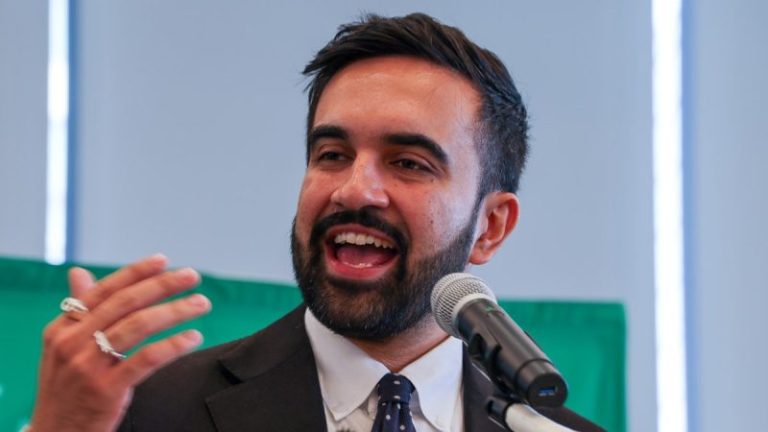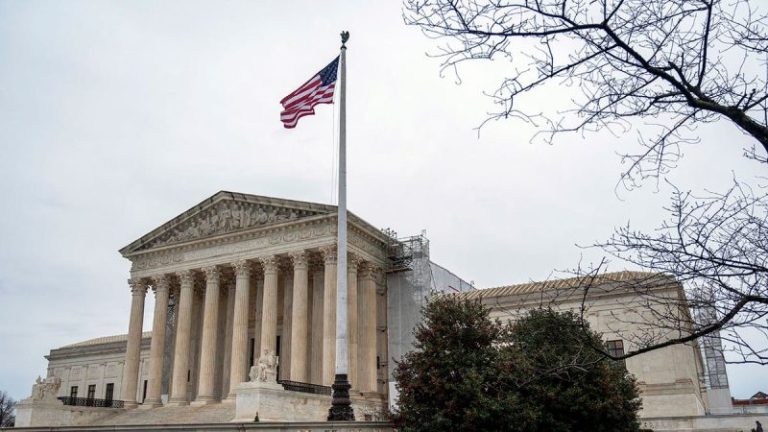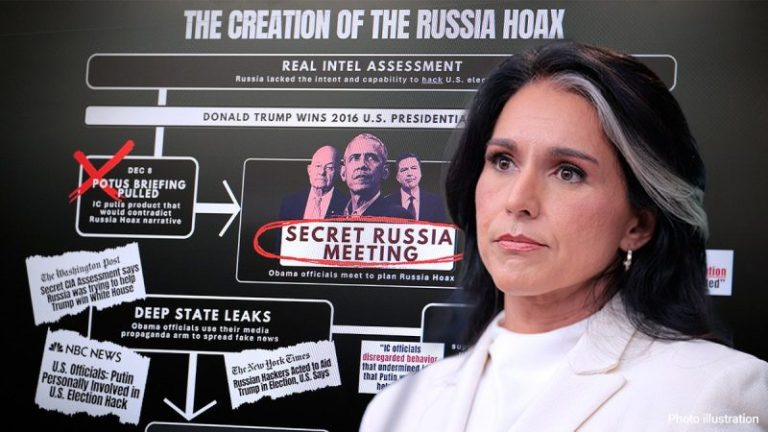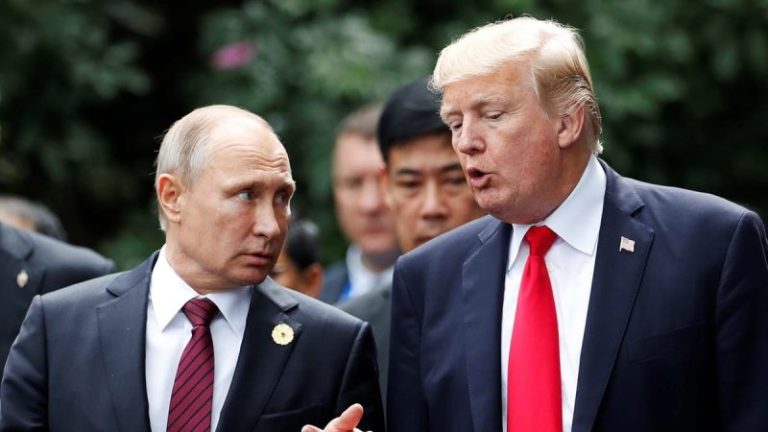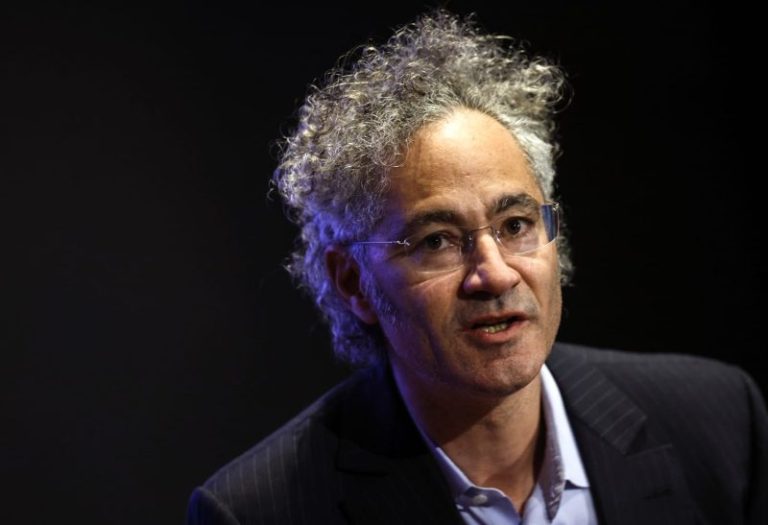Director of National Intelligence Tulsi Gabbard declassified a slew of documents this month, revealing that Obama administration officials ‘manufactured’ intelligence to push the Trump-Russia collusion narrative.
Here’s a look at the newly declassified records:
Declassified Presidential Daily Brief
Documents revealed that in the months leading up to the November 2016 election, the intelligence community consistently assessed that Russia was ‘probably not trying … to influence the election by using cyber means.’
One instance was on Dec. 7, 2016, weeks after the election. Then-Director of National Intelligence James Clapper’s talking points stated, ‘Foreign adversaries did not use cyberattacks on election infrastructure to alter the U.S. presidential election outcome.’
Fox News Digital obtained a declassified copy of the Presidential Daily Brief, which was prepared by the Department of Homeland Security, with reporting from the CIA, Defense Intelligence Agency, FBI, National Security Agency, Department of Homeland Security, State Department and open sources, for Obama, dated Dec. 8, 2016.
‘We assess that Russian and criminal actors did not impact recent U.S. election results by conducting malicious cyber activities against election infrastructure,’ the Presidential Daily Brief stated. ‘Russian Government-affiliated actors most likely compromised an Illinois voter registration database and unsuccessfully attempted the same in other states.’
But the brief stated that it was ‘highly unlikely’ the effort ‘would have resulted in altering any state’s official vote result.’
‘Criminal activity also failed to reach the scale and sophistication necessary to change election outcomes,’ it stated.
The brief noted that the Office of the Director of National Intelligence assessed that any Russian activities ‘probably were intended to cause psychological effects, such as undermining the credibility of the election process and candidates.’
The brief stated that cyber criminals ‘tried to steal data and to interrupt election processes by targeting election infrastructure, but these actions did not achieve a notable disruptive effect.’
Fox News Digital obtained declassified, but redacted, communications from the FBI in the Presidential Daily Brief, stating that it ‘should not go forward until the FBI’ had shared its ‘concerns.’
Those communications revealed that the FBI drafted a ‘dissent’ to the original Presidential Daily Brief.
The communications revealed that the brief was expected to be published Dec. 9, 2016, the following day, but later communications revealed the Office of the Director of National Intelligence, ‘based on some new guidance,’ decided to ‘push back publication’ of the Presidential Daily Brief.
‘It will not run tomorrow and is not likely to run until next week,’ wrote the deputy director of the Presidential Daily Brief at the Office of the Director of National Intelligence, whose name is redacted.
The following day, Dec. 9, 2016, a meeting convened in the White House Situation Room, with the subject line starting: ‘Summary of Conclusions for PC Meeting on a Sensitive Topic (REDACTED.)’
The meeting included top officials in the National Security Council, Clapper, then-CIA Director John Brennan, then-National Security Advisor Susan Rice, then-Secretary of State John Kerry, then-Attorney General Loretta Lynch, then-Deputy FBI Director Andrew McCabe, among others, to discuss Russia.
The declassified meeting record, obtained by Fox News Digital, revealed that principals ‘agreed to recommend sanctioning of certain members of the Russian military intelligence and foreign intelligence chains of command responsible for cyber operations as a response to cyber activity that attempted to influence or interfere with U.S. elections, if such activity meets the requirements’ from an executive order that demanded the blocking of property belonging to people engaged in cyber activities.
After the meeting, according to the Office of the Director of National Intelligence, Clapper’s executive assistant emailed intelligence community leaders tasking them to create a new intelligence community assessment ‘per the president’s request’ that detailed the ‘tools Moscow used and actions it took to influence the 2016 election.’
‘ODNI will lead this effort with participation from CIA, FBI, NSA, and DHS,’ the record states.
Later, Obama officials ‘leaked false statements to media outlets’ claiming that ‘Russia has attempted through cyber means to interfere in, if not actively influence, the outcome of an election.’
By Jan. 6, 2017, a new Intelligence Community Assessment was released that, according to the Office of the Director of National Intelligence, ‘directly contradicted the IC assessments that were made throughout the previous six months.’
Intelligence officials told Fox News Digital that the ICA was ‘politicized’ because it ‘suppressed intelligence from before and after the election showing Russia lacked intent and capability to hack the 2016 election.’
Officials also said it deceived the American public ‘by claiming the IC made no assessment on the ‘impact’ of Russian activities,’ when the intelligence community ‘did, in fact, assess for impact.’
‘The unpublished December PDB stated clearly that Russia ‘did not impact’ the election through cyber hacks on the election,’ an official told Fox News Digital.
The official also said the ICA had assessed that ‘Russia was responsible for leaking data from the DNC and DCCC,’ while ‘failing to mention that FBI and NSA previously expressed low confidence in this attribution.’
Officials said the intelligence was ‘politicized’ and then ‘used as the basis for countless smears seeking to delegitimize President Trump’s victory, the years-long Mueller investigation, two Congressional impeachments, high level officials being investigated, arrested, and thrown in jail, heightened US-Russia tensions, and more.’
Declassified House Intelligence Committee Report
A report prepared by the House Permanent Select Committee on Intelligence in 2020 said the intelligence community did not have any direct information that Russian President Vladimir Putin wanted to help elect Donald Trump during the 2016 presidential election, but, at the ‘unusual’ direction of then-President Barack Obama, published ‘potentially biased’ or ‘implausible’ intelligence suggesting otherwise.
The report, based on an investigation launched by former House Intelligence Committee Chairman Devin Nunes, R-Calif., was dated Sept. 18, 2020. At the time of the publication of the report, Rep. Adam Schiff, D-Calif., was the chairman of the committee.
The report has never before been released to the public and instead has remained highly classified within the intelligence community.
Fox News Digital obtained the ‘fully-sourced limited-access investigation report that was drafted and stored in a limited-access vault at CIA Headquarters.’ The report includes some redactions.
The committee focused on the creation of the Intelligence Community Assessment of 2017, in which then-CIA Director John Brennan pushed for the inclusion of the now-discredited anti-Trump dossier despite knowing it was based largely on ‘internet rumor,’ as Fox News Digital previously reported.
According to the report, the ICA was a ‘high-profile product ordered by the President, directed by senior IC agency heads, and created by just five CIA analysts, using one principal drafter.’
‘Production of the ICA was subject to unusual directives from the President and senior political appointees, and particularly DCIA,’ the report states. ‘The draft was not properly coordinated within CIA or the IC, ensuring it would be published without significant challenges to its conclusions.’
The committee found that the five CIA analysts and drafter ‘rushed’ the ICA’s production ‘in order to publish two weeks before President-elect Trump was sworn-in.’
‘Hurried coordination and limited access to the draft reduced opportunities for the IC to discover misquoting of sources and other tradecraft concerns,’ the report states.
The report states that Brennan ‘ordered the post-election publication of 15 reports containing previously collected but unpublished intelligence, three of which were substandard — containing information that was unclear, of uncertain origin, potentially biased, or implausible — and those became foundational sources for the ICA judgements that Putin preferred Trump over Clinton.’
‘The ICA misrepresented these reports as reliable, without mentioning their significant underlying flaws,’ the committee found.
‘One scant, unclear, and unverifiable fragment of a sentence from one of the substandard reports constitutes the only classified information cited to suggest Putin ‘aspired’ to help Trump win,’ the report states, adding that the ICA ‘ignored or selectively quoted reliable intelligence reports that challenged — and in some cases undermined — judgments that Putin sought to elect Trump.’
The report also states that the ICA ‘failed to consider plausible alternative explanations of Putin’s intentions indicated by reliable intelligence and observed Russian actions.’
The committee also found that two senior CIA officers warned Brennan that ‘we don’t have direct information that Putin wanted to get Trump elected.’
Despite those warnings, the Obama administration moved to publish the ICA.
The ICA ‘did not cite any report where Putin directly indicated helping Trump win was the objective.’
The ICA, according to the report, excluded ‘significant intelligence’ and ‘ignored or selectively quoted’ reliable intelligence in an effort to push the Russia narrative.
The report also includes intelligence from a longtime Putin confidant who explained to investigators that ‘Putin told him he did not care who won the election,’ and that Putin ‘had often outlined the weaknesses of both major candidates.’
The report also states that the ICA omitted context showing that the claim that Putin preferred Trump was ‘implausible —if not ridiculous.’
The committee also found that the ICA suppressed intelligence that showed that Russia was actually planning for a Hillary Clinton victory because ‘they knew where (she) stood’ and believed Russia ‘could work with her.’
The committee also noted that the ICA ‘did not address why Putin chose not to leak more discrediting material on Clinton, even as polls tightened in the final weeks of the election.’
The committee also found that the ICA suppressed intelligence showing that Putin was ‘not only demonstrating a clear lack of concern for Trump’s election fate,’ but also indicated ‘that he preferred to see Secretary Clinton elected, knowing she would be a more vulnerable President.’
Declassified Hillary Clinton section of House Intelligence Committee Report
One section of the declassified House Intelligence Committee report states that the material in Putin’s possession included Russian intelligence on Democratic National Committee information allegedly showing that senior Democratic leaders found Clinton’s health to be ‘extraordinarily alarming.’
‘As of September 2016, the Russian Foreign Intelligence Service had DNC information that President Obama and Party leaders found the state of Secretary Clinton’s health to be ‘extraordinarily alarming,’ and felt it could have ‘serious negative impact’ on her election prospects,’ the report states. ‘Her health information was being kept in ‘strictest secrecy’ and even close advisors were not being fully informed.’
The Russian Foreign Intelligence Service also allegedly had DNC communications that showed that ‘Clinton was suffering from ‘intensified psycho-emotional problems, including uncontrolled fits of anger, aggression, and cheerfulness.”
‘Clinton was placed on a daily regimen of ‘heavy tranquilizers’ and while afraid of losing, she remained ‘obsessed with a thirst for power,’’ the report states.
The Russians also allegedly had information that Clinton ‘suffered from ‘Type 2 diabetes, Ischemic heart disease, deep vein thrombosis, and chronic obstructive pulmonary disease.’’
The Russians also allegedly possessed a ‘campaign email discussing a plan approved by Secretary Clinton to link Putin and Russian hackers to candidate Trump in order to ‘distract the American public’ from the Clinton email server scandal.’
Gabbard, during the White House press briefing Wednesday, said there were ‘high-level DNC emails that detailed evidence of Hillary’s, quote, psycho-emotional problems, uncontrolled fits of anger, aggression and cheerfulness, and that then-Secretary Clinton was allegedly on a daily regimen of heavy tranquilizers.’
A tranquilizer is a drug used to reduce mental disturbance, such as anxiety and tension. Tranquilizers are typically prescribed to individuals suffering from anxiety, sleep disturbances and related conditions affecting their mental and physical health.
A Clinton aide dismissed the claims as ‘ridiculous.’
Neither Clinton nor Obama responded to Fox News Digital’s requests for comment.
This post appeared first on FOX NEWS

